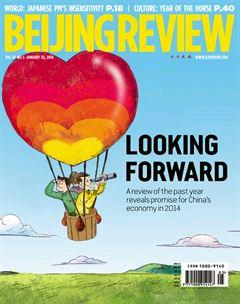Forging Ahead
The statistics on national economic development in 2013 released by the National Bureau of Statistics on January 20 should strengthen peoples confidence in the continuous improvement of the Chinese economy in 2014.
Although the economic growth rate of 2013 dropped to its lowest point for the past 14 years, it remains more robust than the global average. More importantly, the quality of the Chinese economy in 2013 is the highest compared with that of previous years. While the economy maintained a relatively high growth rate at 7.7 percent, inflation dropped sharply, with CPI down to 2.6 percent.
This achievement has not come easily. In the first two quarters last year, the growth rate presented a declining tendency, from 7.7 to 7.5 percent. In response, the Central Government stepped up its policy of keeping growth steady and made subtle preemptive adjustments to existent policies, as well as introducing several favorable new ones. These measures managed to reverse the declining trend of the economy and in the third quarter, the growth rate rebounded to 7.8 percent.
Aside from the recovering growth rate, the share of the tertiary industry surpassed that of the secondary industry for the first time, a significant change. It shows that after several years of economic transformation, the imbalance in the countrys economic structure has been somewhat corrected and the service industrys contribution to the economy is becoming the mainstream.
2014 marks the year of all-round deepening of economic reforms for China. In the coming years, reform will continue to be the major driving force behind the economic growth. The merits of restructuring of the economy will be clearer. In the past, Chinas economy depended on investments and foreign demand, and also high-polluting and high energy-consuming industries for development. This situation will be thoroughly altered. It is believed that in the following years, the Chinese economy will enter a state of stable, sound and sustainable development. This is a positive factor to stabilize world economic development.endprint

